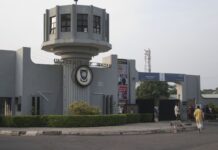Ime Akpan
The chairman of the Code of Conduct Tribunal (CCT), Mr. Danladi Umar on Monday adjourned till January 22, 2019 proceedings in the trial of the Chief Justice of Nigeria (CJN), Mr. Walter Onnoghen for alleged false asset declaration.
The CJN faces six counts of failing to disclose many bank accounts linked to him as a judge on the Supreme Court, which he had allegedly used to save millions in local and foreign currency.
At the opening hearing today, Onnoghen was absent, but he had a team of 47 senior lawyers, led by Chief Wole Olanipekun, who represented him.
It could not be ascertained whether Onnoghen’s absence was in compliance with the advice of the South-South Governors’ Forum, which came amidst allegations that the proceeding was vindictive and anti-democratic.
The tribunal adjourned the case after the lead prosecuting counsel, Aliyu Umar (SAN), conceded that Onnoghen was not properly served with the charges and the summons.
Umar agreed that the CJN was not personally served with the charges and the court’s summons, as required by the law.
He said he had just been served with the application and argued that the arraignment ought to have taken place before any application is brought.
He, therefore, requested the tribunal to direct a fresh service on the CJN.
“By what the registrar has said, although the defendant was the one who directed his personal assistant to accept service on his behalf and what the law says is that he must be personally served.
“We agree that that the service should be properly done. The processes should be served personally on him.
“If, after the service is done, and the defendant is not present, we can then argue whether or not he needs to be present on the grounds that he has filed a motion challenging the jurisdiction of the court,” he said
Olanipekun, who entered defence for the CJN, had begun by challenging the jurisdiction of the case.
“You have to first determine whether you have the jurisdiction to try this matter,” Olanipekun said to the CCT chairman, Umar.
He said Onnoghen had not been indicted by the National Judicial Council (NJC) as legally required of serving judges before his matter was picked up by the tribunal following a petition filed by a member of the ruling All Progressives Congress.
He also said his client was not given enough time to prepare for his arraignment before being summoned by the tribunal.
Onnoghen was absent from the Monday’s proceedings.
Upon an inquiry by the tribunal chairman about Onnoghen’s absence from court, Olanipekun said the CJN needed not to be present, having filed a motion to challenge the tribunal’s jurisdiction.
He said he and other defence lawyers only appeared in court in protest against the jurisdiction of the tribunal.
He also said that from the account given by the court official earlier in the proceedings, the CJN was not served with the charges and summons personally, but through his aide.
Olanipekun insisted that the law requires that the defendant be served personally.
The charges against Onnoghen emanated from a petition submitted to the Code of Conduct Tribunal on January 9 by Mr. Dennis Aghanya, a former media aide to President Muhammadu Buhari and a member of the ruling All Progressives Congress in Enugu State.
Onnoghen, 17th CJN, is the first serving Chief Justice to be arraigned for criminal offences.
How the charges were filed has been amongst the most controversial aspects of the development since its disclosure on Saturday.
Lawyers, including the Nigerian Bar Association (NBA), have argued that Onnoghen’s trial would not stand because he has not been previously investigated and indicted by the National Judicial Council (NJC) as required by an existing judgement.
They rely on a decent decision of the Appeal Court in Lagos, which said the NJC must first sanction a serving Judge before they can be arraigned in any court.
Although that Appeal Court judgment, which was delivered against the Economic and Financial Crimes Commission (EFCC), was appealed by the anti-graft office to the Supreme Court, no verdict had been reached on the matter.
With Punch and Premium Times reports
























































